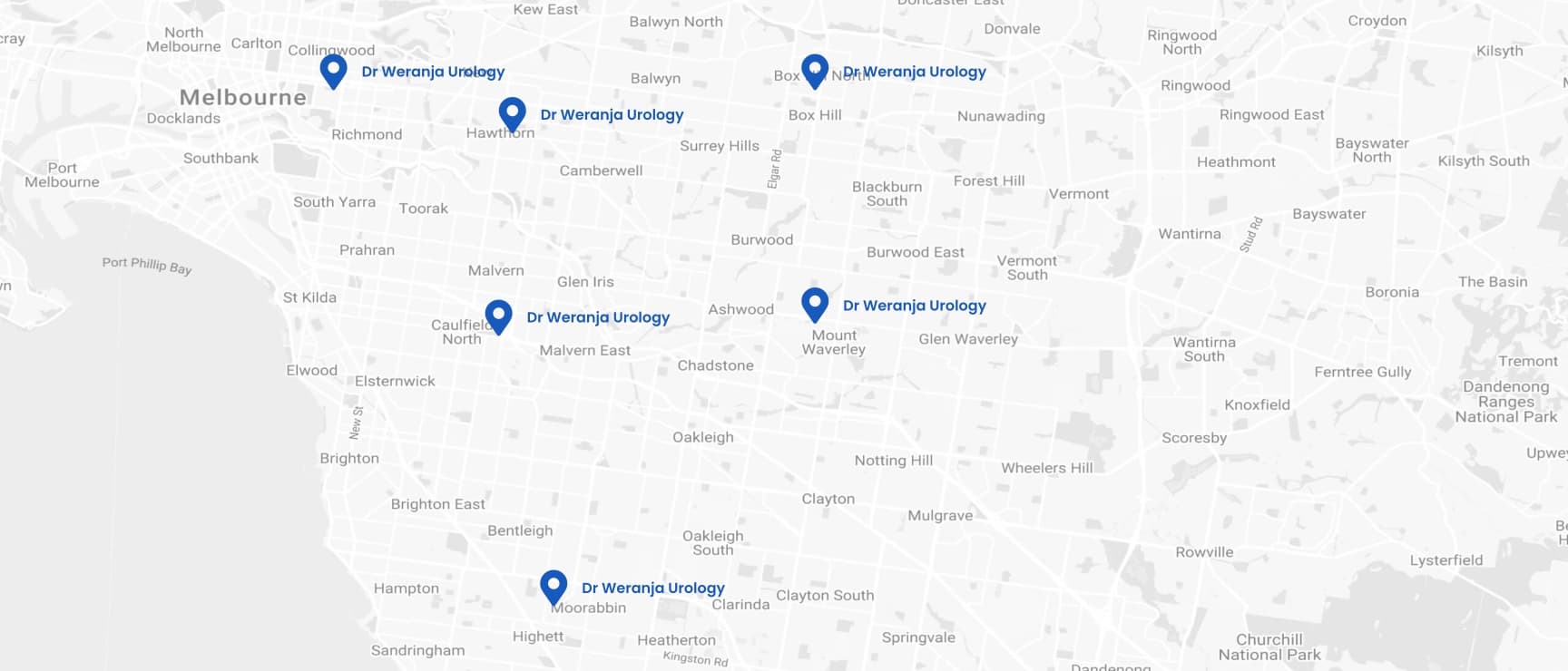Melbourne urologist
bladder conditions
Melbourne urologist bladder conditions
What is the bladder?
Let’s start with the basics: your bladder is a hollow muscular organ in your pelvis which stores urine. The bladder muscle is like a balloon and stretches as it gets filled up with urine and that allows the organ to store it without leakage until you need to pass urine.
Problems with the bladder and with urination are very common. Most bladder patients I see either have problems with difficulty passing urine or with urine leakage, both of which can be quite distressing.
Melbourne urologist bladder conditions
Problems with urination - Difficulty in passing urine
Difficulty passing urine is a common problem. There are a number of reasons why you could have difficulty passing urine: it could be a problem related to the bladder, the urine control mechanism (sphincter muscle), or related to other structures associated with the urethra (such as the prostate in males).
You may experience symptoms associated with difficulty passing urine itself or difficulty holding or controlling the urine.
Some of the symptoms you may notice are :
- A weak urinary stream (the flow deteriorates or stops and starts)
- Difficulty starting urination
- Dribbling at the end of your stream
- Waking up at night to pass urine
- The sensation of incomplete emptying of your bladder
- Urgency – unable to hold on or needing to go when you need to go
- Frequency – Needing to pass urine often
- Pain on passing urine
- Blood in the urine or cloudy urine
- Leakage of urine
- Inability to pass urine
The causes
The most common cause of difficulty passing urine in men is an enlarged prostate.
There are other causes, such as problems with your bladder muscle. Other causes may be linked to a neurological problem with the nerves supplying the bladder. There can also be a narrowing of the urethra or it can be affected by scar tissue from an earlier surgery or trauma (urethral stricture).
Should I see a doctor about my symptoms?
It is important to have your symptoms checked out, in the first instance by a GP who will refer to a urologist if a follow-up investigation is needed.
If you are suddenly unable to pass urine, then it is urgent to see your urologist or to seek emergency medical care, as this can lead to serious complications including kidney damage.
Treatment depends on the underlying cause and as a urologist, I always aim to address the causes, not just the symptoms. The goal of this joint journey we are on is to improve your quality of life.
Certain medications or surgery can be helpful in addressing urinary problems. I believe in using a non-surgical approach first (or the most conservative/least invasive) to address your issue and to discuss surgery if that non-surgical approach does not achieve the results we are after.
When you come to see me at my practice in Melbourne, we will look at your medical history, and we will take the time to discuss your symptoms and plan routine tests. That will allow us to make well-informed decisions about the best and most suitable treatment.
Melbourne urologist bladder conditions
Incontinence
Urinary incontinence or involuntary urine leakage of urine is quite common. There are different types we distinguish as a urologist:
- Stress incontinence: The pressure in your abdomen increases when you cough or sneeze.
- Urge incontinence: You are unable to hold your urine and feel a strong urge to pass urine, causing leakage before you can go to the toilet.
Stress incontinence is more common in women, after childbirth or with age. In males, it can occur after some surgical procedures. The inconvenience definitely impacts how you feel, and even have a serious effect on your quality of life.
What causes incontinence?
In women, it is mainly caused by weakness of the pelvic floor or the bladder muscles. When you deliver a baby, your pelvis floor muscles can get stretched and they become weaker. That then causes you to lose urine as you cough or sneeze, but the stretched muscles can also lead to a prolapse. In males, the mechanics are similar when incontinence occurs. After prostate surgery, there is a disruption of the pelvic floor or the sphincter muscle and that can lead to stress incontinence.
Other causes include:
- Obesity
- Hormonal imbalances from menopause
- Problems with the bladder muscle itself
- Problems with the nerves supplying the bladder
What type of treatment can a urologist offer?
As your urologist here at my practice in Melbourne I use a multi-modal therapy approach. It means that we combine treatment avenues to get the best possible outcomes. I understand that a bladder condition can impact your life, and when we start the treatment journey together, my role is to help you make the best possible choices. We start with the least invasive, non-surgical treatment options, combining medication and pelvic floor physiotherapy.
We can discuss lifestyle changes for example to improve some of the symptoms, such as losing weight, quitting smoking or changing your diet, and introducing specific exercises. When we discuss your treatment options, I will customise the adjustments to your circumstances. Only when it is necessary will we discuss the surgical options to treat your bladder problem.

Melbourne urologist urethral stricture
Urethral stricture
Urethral stricture is a narrowing or scarring of your urethra, which is the tube that delivers urine from your bladder to the outside world when you pass urine. This scar formation causes an obstruction to the urine flow and can cause difficulty in passing urine.
The most common causes are previous surgery or trauma which causes scarring of your urethra. You may develop voiding symptoms such as a weak urinary stream (the flow deteriorates or stops and starts), inability to pass urine, and others.
Treatment depends on the severity and amount of scar tissue and in most cases needs surgery. Treatment can consist of minor surgery to have the scar tissue stretched out or to cut through the scar tissue under an anaesthetic. In other cases, you might need major surgery to have the segment of the affected urethra removed and reconstructed. Other therapies such as intermittent self-catheterisation can be helpful.
Melbourne urologist bladder conditions
Blood in urine
Blood in your urine can either be associated with pain or it can be painless. The observations can range from bright red to dark in colour. The most common cause of blood in the urine is an infection of your bladder or your kidney and in men, it can be due to an enlarged prostate.
Other causes include:
- Bladder or kidney stone
- Cancer
- Kidney diseases such as inflammation of the kidney, its blood vessels or immune problems
- Trauma
- Medications
- Vigorous exercise
Should I see a doctor about my symptoms?
Whether you see blood in the urine yourself or you are told by your urologist that you have blood in the urine, you should get this evaluated by your GP or a urologist. That is important to exclude any serious conditions such as cancer of the bladder or kidneys.
Treatment depends on the cause of the blood in the urine. In most cases of blood in the urine that you can not see, no serious cause is found. Conditions such as bladder or kidney infections or stones are quite common can be easily treated. However, we need to exclude cancer, and picking it up at an early stage can offer the best outcomes.
Melbourne urologist bladder cancer
Bladder cancer
Bladder cancer is a condition where cells within the lining of your bladder start growing in an uncontrollable fashion and can then spread outside of the bladder to different parts of the body. As statistics tell us, almost 3,000 Australian men and women are diagnosed with bladder cancer every year.
Not all bladder cancers are the same. While some bladder cancers are slow-growing and rarely invade into the bladder muscle or spread, others can be fast-growing and spread to other parts of the body rapidly. Early detection and treatment of bladder cancer offer the best outcomes.
How is it diagnosed?
Majority of patients present with blood in the urine (that you can see or picked up on a urine test) or with urinary symptoms such as pain on passing urine, needing to pass urine often or sometimes back pain.
Abnormalities of the bladder are evaluated using scans (ultrasound, CT or MRI), urine tests, and a cystoscopy (passing a small camera through your urethra into the bladder). If these reveal suspicion of bladder cancer, we can use biopsies with the removal of the bladder tumour to obtain optimal information about the aggressiveness of the bladder cancer.
What are the causes of bladder cancer?
There are a number of risk factors for developing bladder cancer. Smoking is the most common risk factor. Other causes include age and being male, exposure to certain chemicals or textile dyes, previous cancer treatments such as radiation therapy, chronic inflammation of the bladder, and family history of bladder cancer.
Treatment
The treatment depends on a number of factors including cancer-related factors such as aggressiveness and the amount of cancer that you have as well as your general health.
The initial step is to accurately determine the aggressiveness of the cancer, the amount of cancer and to assess if it has spread.
Urologist Melbourne
Why A/Prof Weranja for bladder conditions?

‘I believe that when you come to see me as your urologist, you deserve to be treated as a person rather than as a disease or a case. That is why I take the time to listen so I get a full understanding of your symptoms, your condition, and how it affects your life.’
Then I use my experience to help you in the best possible way. In addition to my urology training in Australia, I have spent 2 years training at MD Anderson Cancer Center (ranked number 1 cancer care in the US) and have had extensive advanced surgical training in urologic cancer surgery.
We plan a clinical evaluation to assess the underlying cause of the symptoms including a full prostate and bladder workup including some blood tests and urine tests.
Further evaluation happens with an ultrasound or CT scan and if needed a cystoscopy (a small camera passed into your bladder). These tests help assess your prostate, bladder, and also your kidneys. In most cases, the tests are merely planned to exclude more serious underlying causes of your bladder problem, but if you are diagnosed with cancer, I am here to support you.
Then we use the best possible multi-disciplinary approach tailored to you to ensure that you are supported throughout the journey, from diagnosis, treatment to post-op treatment.

- Camberwell Road Specialists and Allied Health
- Ground floor, 124 - 126 Camberwell Road
- Hawthorn East VIC 3123
- Waverley Private Hospital
- 343-357 Blackburn Road
- MOUNT WAVERLEY VIC 3149
- Holmesglen Private Hospital
- 490 South Road, Suite A1,
Moorabbin VIC 3189
- Epworth Eastern Hospital,
- 1 Arnold St,
- Box Hill VIC 3128
- Epworth Freemasons Medical Centre
- 320 Victoria Parade,
1st Floor, Suite 103
East Melbourne VIC 3002
- Cabrini Hospital Malvern,
- 181/183 Wattletree Rd,
- Malvern VIC 3144

